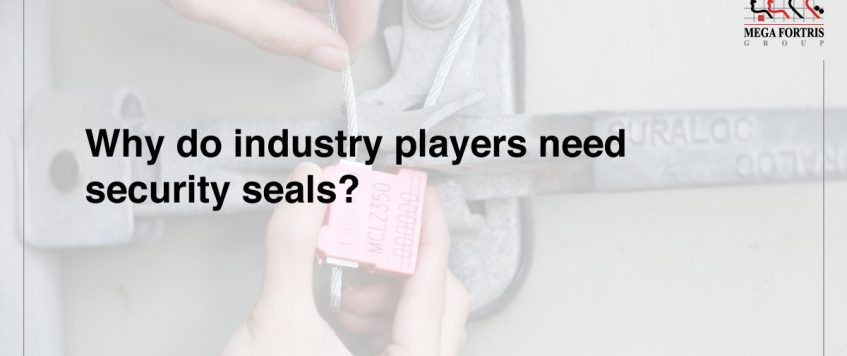-
05
Feb
Why do industry players need security seals?
Outside of the logistics business, many may not see its significance, but security seals are known widely as tamper-evident mechanisms used to seal cargo that are in transit shipping containers. They work to provide some level of security for cargos that are in shipment. High-cost cargos usually face high risks of being hijacked, stolen, tampered with or swindled while in transit. Especially at sea, when international waters are common breeding grounds for criminals, thieves, pirates or other extremist groups. Freight shipped cargos don’t only face the risk of theft but this widespread concern is scattered across the supply chain from 1PL down to 4PL. Risk is evident even in road haulage of cargo, along with other forms of logistical transport in the process.
With the resumption of the transportation industry amid the pandemic, cargo shipments are now at risk more than ever from hijackers and smugglers attempting to exploit the situation. The rising numbers also see growing crimes of theft and swindling of cargo shipments threatening many different industries. And so, the need for goods security is both a guarantee and risk-avoidance insurance.
For business owners, losing their cargo could bring about some disruptions to their business one way or another, regardless of insurance coverage. But security seals are more than security itself. They act as a quality assurance layer to ensure the product upholds its material integrity for authentication purposes. Security seals are the most common measure for tamper detection to secure cargo. An unopened seal assures the transported cargo is handled with care after several logistical parties.
Can security seals be overlooked or disregarded?Adherence to the regulatory requirements of shipping or manufacturing laws is mandatory. With high benchmarks of safety standards, security seals on all transported cargo are basic legal requirements.
High-Security Seals are designed to conform with ISO Security Seal Standards and international customs regulations. The International Standards Organization’s (ISO) version of ISO 17712 in 2013, highlights the requirements of certain security seal levels to improve tamper resistance recognition of shipping containers.
In all countries, security seals are standard customs regulation. Customs accepted seals are the security seals in which any given country’s customs departments will approve as a secure seal. This does not imply that all exporters or importers should replace their higher quality seals with the minimal standards of customs accepted seals. A Customs Accepted Seal should be properly tested beforehand to ensure it is of high quality.
What about low-quality Seals?Skimping on security costs is a more common practice than most would think. While it is an acceptable decision to cut down costs wherever possible, the risk and consequences are not worth doing. Opting for a cheaper seal would mean lesser safety for goods. An easily broken security seal is no security seal. Between having lost the assurance of the quality of goods and the risk of having goods stolen, the backlash of using low-quality seals does not measure up with the cost saved.
How to Choose the Choose the Right Security Seals?There are several selections of security seals, applicable in many situations for different types of goods. Security seals are divided into two groups of operation; reusable grade and single-use grade. Single-use seals are typically made out of plastic or metal. Reusable seals are more sophisticated. They are usually electronic seals and at least mechanical seals designed to last more than several uses. In the transportation industry, mechanical or electronic seals are preferred where seals are fixed to trucks, shipping containers or large trailers. Single-use seals are for much lower risk cargo such as packages and parcels. The different types of seals are either metal seals or plastic seals.
- To understand what type of security best suits your business, first, understand what type of cargo is being protected.
Companies should analyse the value of the goods, the type of goods and their potential threats, whether intentional or unintentional, which would cover external environmental factors. Determine whether theft or tampering is a threat to the products and whether they have a history of being tampered, stolen or sabotaged. Assessing the risk of the nature of goods will provide a more detailed evaluation of the type of security seal best suitable.
- Determine what value such goods will be to thieves, hijackers and pirates.
Certain products are more vulnerable to imminent theft such as high-cost cargo, electronics, pharmaceutical drugs, and expensive machinery. Untraceable goods are also common prey to theft as such goods can be resold, stored and transported illegally. For more extreme parties, dangerous goods such as weaponry, chemical substances, or explosive material may be targeted.
- Education on the quality and types of seals is important for a company
To have expertise in security seals areas can be a boon when determining the most suitable type of seal for each situation. Understand the differences of indicative, barrier and electronic seals and how each plays a part in different environments. Indicative seals can change shapes or its visual composition to show signs of the goods being tampered with. Locking bars and cable seals cannot be re-secured when forcefully cut open. These functions serve well to provide an indication of goods being tampered. Bolt seals, lock bars, cable seals are barriers. Electronic seals are equipped with Radio-Frequency Identification (RFID) with tracking capabilities. Identify the benefits and downsides between plastic seals and metal seals. Categorize plastic seals into its respective security levels, and similarly with metal seals. It is always advisable to inspect the seals physically to have better categorization standards.
- Identifying the mode of transportation is beneficial to determining the suitable type of seal.
Different types of transportation methods are exposed to various environmental factors. In most cases, the size and shape of the cargo is a factor as well. Next, understanding Customs and Border Patrol’s shipping regulations of every country will provide insight into the most suitable type of seal to purchase for security and meet the regulatory standard.
- The seals’ ability to be installed or removed should be inspected.
For some seals, notably electronic seals, a specific type of expertise in labour or technology is required. Such requirements should be well-prepared for as well as the proper operation manual of seals. Shippers or business owners should be educated on the proper application of the selected seal and whether a consignee agrees to the type of seal. To determine the most suitable seal for your business, choose a balance between security and simplicity. Both the seller and consignee parties will need to know how to operate the seals should training be required.
Security Seals are not impervious
In a nutshell, security seals come with their own vulnerabilities and are not designed to solve security issues. But again, there are no perfect security measures but having one brings benefits that far outweigh having none. Business owners are well-advised to take every possible step to lower the risk of their goods’ vulnerability.
Secure your cargo, seal the dealMega Fortris is one of the world’s largest manufacturers of security seals, container bolt seals, tamper-evident products, and complete solutions to secure goods. The award-winning and standards accredited company offers a full range of highly tamper-evident and cost-competitive security products. With the versatility and efficiency of the products and services, the company is ready to serve the industry players intent to implement traceability in their operation.
Our security seal solutions have been recognised worldwide for its high quality and compliance with ISO 9001 and ISO 14001 requirements and environmental legislations. Our range of tamper-proof and trackable security seals, bags, labels and tapes can be used across various receptacles used across the supply chain, from trailer doors, containers, trucks, cartons, and boxes.
To learn more about the wide range of security seals available for different cargo and modes of transport, visit Mega Fortris Group, trusted, world-class security seal designer and manufacturer with over 20 years of experience.

